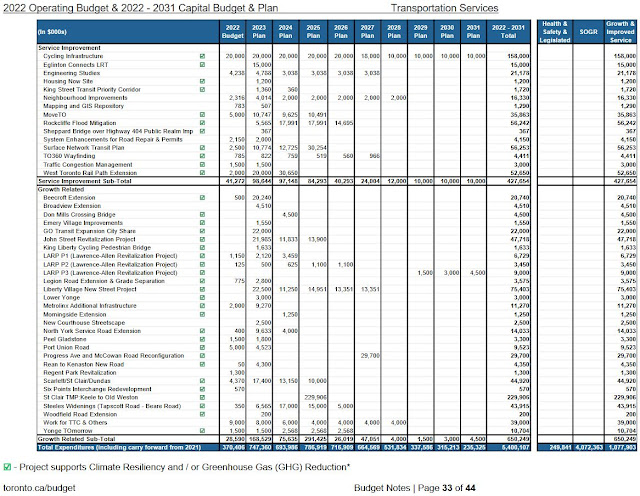Get out your calculators, folks! It’s budget time again at Toronto city hall after having released their 2022 tax supported budgets on Thursday, January 13. One budget item which captured considerable media attention is the $25 million increase in the Toronto Police budget to $1.1 billion despite numerous groups and advocates calling to #DefundThePolice during the 2020 Black Lives Matter movement. While I’m sure Torontonians have lots of competing interest for this budget such as housing, transit, childcare, or long-term care, I will focus on the cycling perspective and refer to the Transportation Services budget notes.
A Much-Needed Funding Boost
Hot off the heels of last month’s bike plan approval, the budget confirms the $20 million annual budget from 2022 to 2026. This compares to the $16 million budgeted annually from 2017 to 2021. The amount is reduced to $18 million in 2027 and then to $10 million annually from 2028 to 2031. This should ensure coverage for not just the current near-term plan, but also the next one whether it be 2024-26 or 2025-27.
One demand cycling advocates made to ensure the Pedestrian and Cycling Unit fully spends the cycling infrastructure budget is increase staff capacity. The good news is this budget calls for six additional people for that unit. However, the question remains whether the $60 million budgeted from 2022 to 2024 – plus any monies Toronto gets from the federal $400 million active transportation fund – would lead to 100 kilometres of bike lanes compared to 54 kilometres installed during the previous near-term plan (2019-21). This need for accountability is one called for by the Toronto Community Bikeways Coalition.
Projects Funded Separately
Last year’s budget called for $6 million in funding for Eglinton Connects in 2022 and another $9 million for 2023. This year’s budget calls for that $15 million to be spent next year instead. Something likely caused by the Crosstown LRT not expected to enter service until 2023. An additional $75 million is shown as a capital needs constraint, so some accountability is needed for what this $15 million can achieve in 2023.
Several cycling related projects show up separately such as the following:
- West Toronto Railpath Extension
- Port Union Road
- Peel-Gladstone
- St. Clair – Keele Transportation Master Plan
- Scarlett / St. Clair / Dundas Intersection
- yongeTOmorrow
- Liberty Village New Street
- Steeles Avenue Widening
One new feature with this budget is green checkmarks are shown for those specific projects that support climate resiliency and/or greenhouse gas reduction. For the service improvement and growth categories, it’s akin to covering the table with green paint. A language all too familiar to those of us who bike. 😏
Other projects such as REimagining Yonge in North York Centre were placed under capital needs constraints given major works are not expected to start until 2026.
Bike Share Toronto
The Toronto Parking Authority – which oversees Bike Share Toronto – is covered through the rate supported budget process. After taking a break in 2021, the TPA budget shows a return to bike share expansion from 2022 to 2025. This year will see 38 stations and 700 bikes added for a total of 663 stations and 7,550 bikes at a cost of $2.125 million. 200 of the new bikes will be e-assist; thus bringing the total number of e-bikes to 500.
Further expansions worth $3 million, $5 million, and $7 million are expected respectively in 2023, 2024, and 2025. Assuming the same proportions of stations and bikes are purchased in the following years – and before accounting for inflation – the network size could look like this by 2025 after doing some rounding. Of course, these numbers should be taken with a grain of salt.
One question that remains is will this expansion finally lead to bike share in all 25 wards by 2025?
Vision Zero
The road safety plan budget comes to $106 million from 2022 to 2024, while approximately $5 million annually is budgeted from 2025 onwards pending a new road safety plan. That budget likely includes the purchase and installation of 25 additional speed cameras this year for a total of 75 (or three per ward) which was recently approved by the Infrastructure and Environment Committee. With jurisdictions such as New York City aiming for 2,200 speed cameras by the end of this year, road safety advocates need to call for a tenfold increase in speed cameras to 750 during this year’s election. Of course, they are no substitute for redesigning our streets, but can nudge drivers to slow down until these redesigns can occur.
Get Involved
Public deputations for this year’s budget will take place virtually on Monday, January 24 and Tuesday, January 25. Those interested in speaking should e-mail buc@toronto.ca by Friday, January 21 at 4:30 PM. Alternatively, you can send in your comments to the same e-mail address. Let’s call on the City to not only support the proposed budget increases for cycling – including Bike Share Toronto – but also demand further funding for the road safety plan including additional speed cameras.



No comments:
Post a Comment